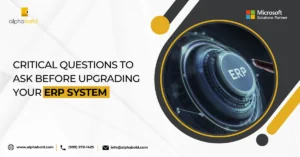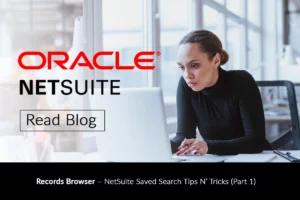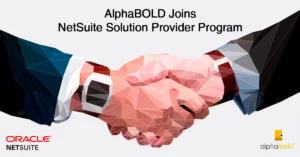Introduction
As businesses strive for efficiency and streamlined operations, integrating with NetSuite can be a game-changer. This article will explore the top 5 questions you should ask when Integrating with NetSuite. Whether you’re a finance manager, IT professional, or business owner, these questions will guide you toward a successful integration, ensuring your business thrives in the digital landscape.
1. Did you Complete a Cost-Benefit Analysis?
What is the Cost-Benefit Analysis?
A cost-benefit analysis is a systematic process businesses use to analyze which decisions to make and which to forgo. The cost-benefit analyst sums the potential rewards expected from a situation or action and then subtracts the total costs associated with taking that action. Source: Investopedia
Companies preparing for considerable investments must evaluate short- and long-term cost savings and potential revenue increases before deciding on the path forward. When the benefits of the analysis exceed the drawbacks, organizations can generally assume that they will be more successful by automating their data sync.
What is your Anticipated ROI When Integrating With NetSuite?
The decision-making process should be driven by a potential increase in profitability resulting from the integration/automation. It is paramount that the project team calculates the improvements in efficiency resulting from the proposed automation and how these will affect the company’s revenue and profitability.
Below are some tools that we feel will help you with your analysis:
2. Does the External System have a Modern API?
What is a modern API (Application Programming Interface)? In this age, it is a robust external and secure application layer (set of rules which helps applications communicate and interact with each other) that can be accessed in the cloud, over the internet. It is strongly suggested that the application you are trying to connect with NetSuite have an API. Without it, you will likely face high costs if you try to build it or experience inefficiencies from processing flat files dropped and stored on SFTP servers.
Today, there are two common data integration protocols used to connect two systems over HTTPS (Hypertext transfer protocol secure); these are SOAP (Simple Object Access Protocol) and REST (Representational State Transfer).
SOAP is the older of the two protocols (hence, well-established), and Microsoft created it. It uses XML (Extensible Markup Language) to transmit messages between two systems. Through its web services, NetSuite has been supporting SOAP protocol to communicate with external applications since its inception. The system uses WSDL (Web Services Descriptive Language), a set of methods and rules that NetSuite enforces for external services attempting to communicate with it over SOAP. With upgrades to NetSuite functionality, WSLD also gets upgraded through version control. Thus, when connecting external applications to NetSuite via SOAP, it is important to adjust the endpoints as new versions are added twice yearly.
REST is a relatively new (it has been in use for over 10 years) method of communication with NetSuite. It commonly exposes its API over the internet (HTTPS in NetSuite), allowing external applications to access application logic and services instead of data. REST typically works with JSON (JavaScript Object Notation) formatted messages. NetSuite introduced REST web services in 2019. These facilitate CRUD (create, read, update, delete) operations for main record objects. These web services are similar to NetSuite WSDL in that they provide the back-end validation and rules by which JSON objects must be submitted to NetSuite so that each supported operation is successful. NetSuite can also expose REST endpoints through a ‘RESTlet.’ ‘RESTlet’ is a script that will ingest a JSON object, process it and then affect the system as per the developer’s design and/or needs.
Streamline your Business Processes with NetSuite Integration
Integration complexities should not hold your business back. AlphaBOLD specializes in simplifying NetSuite integrations, offering bespoke solutions that align with your unique requirements. Let's discuss how our NetSuite Integration Services can streamline your operations and drive growth.
Request a DemoWhich protocol should you use?
REST Advantages:
- The most widely used protocol by significant service providers like Google, Amazon, eBay, etc.,
- REST is generally easier to read, test, and work with than SOAP due to JSON formatted messages,
- Typically, REST is faster than SOAP and provides better performance through caching of data,
- Coding with REST is quicker and easier to scale, eliminating the need for rebuilding the code from scratch.
SOAP Advantages:
- More robust security through the use of WS-Security (Web Standards Security) specification,
- Unlike REST protocol, SOAP offers built-in retry logic in case of failed communications,
- In some cases, SOAP may be less complex to work with than REST because its WSDL provides consistent handling for certain complex operations (i.e., inventory detail handling for Item Fulfillments and Item Receipts in NetSuite)
- In the context of NetSuite, SOAP web services may, in certain situations, process requests quicker than REST web services; this is because NetSuite uses SuiteScript to translate JSON objects into Java, which then writes to the Oracle database. This process is more efficient via SOAP.
Your decision on what protocol is right for you will depend on many factors, including your developer’s experience, which middleware they are using, what type of integration they are building (i.e., real-time e-commerce integration may be easier to execute with a REST protocol, while a large number of concurrent calls may be handled better by NetSuite SOAP web services).
3. Did you Look for ‘Plug-&-Play’ Solutions when Integrating With NetSuite?
Now that you know the cost of inaction, start looking for out-of-the-box solutions or built-in connectors. These are typically sold as SAAS monthly / annual subscriptions. Regardless of the monthly subscription cost, we recommend that you opt-in for a product that can be easily configured and requires very little support. This is especially important if your organization has a small technical team.
The Advantages of Buying these Built-in Connectors are:
- Simple to configure and set up (most of the time),
- Low, upfront cost,
- Require little or no maintenance,
- Designed for optimal performance,
- Have widespread use.
Some Disadvantages Can Be:
- Potential fixed-term contract lock,
- Lack of homegrown expertise to take full advantage of the tools,
- Difficult to extend and/or repurpose.

User Handbook To Lead Successful Netsuite ERP Implementation
Unlock the secrets to a successful NetSuite ERP implementation with our comprehensive user handbook
Download Guide
4. Did you Choose the Right Technology/Middleware, and Can Your Solution Scale When Integrating with NetSuite?
Many integration solutions are out there, and they all have varying degrees of fit and are priced differently. As mentioned above, we recommend SAAS plug-and-play connectors as they often are the least costly options in the long run. However, there are situations where you are left with no choice but to build a custom connection. This is especially true when connecting your NetSuite system to another legacy application without an API.
Regardless of your Situation, Be Sure to Consider the Following:
Your Technology Stack:
Your IT team should analyze your organization’s technology infrastructure (stack) and pick a solution or programming language that is in line with your infrastructure. This will make the implementation more efficient and the adoption easier.
Your Technical Team’s Experience:
Depending on your team’s skillsets and know-how, they may have some familiarity with plug-and-play connectors, specific middleware, or experience building custom connections. It is wise to leverage this knowledge as it will eliminate the learning curve and the need for external consulting help; this will lower your implementation costs.
Your Solution’s Scalability:
This is perhaps the most important point; when implementing integration solutions, you always need to ask yourself: ‘Can my solution be easily adjusted, and can it easily grow with the company’s everchanging needs?’ This question is difficult to answer and requires detailed planning and forward thinking. Some questions to ask yourselves or your partner are:
- How easy is extending my integration or SDK (Software Development Kit) as the company needs to change?
- How will my integration be affected by unusual peaks or gradual increases in traffic?
- How easy is it to train both internal and external personnel to support the solution’s transformation in the future?
- Does my integration solution support industry standards and best practices?
- Is my data secure throughout the project’s lifecycle and its evolution?
- Can my solution be adapted to different IT infrastructures and technology stacks?
5. Do you have the Right Integration Partner?
Should you decide to engage external resources to assist you with your integration, it is important to vet your future partners properly. Choosing an unreliable partner can put your entire project at risk and prove very costly for your organization. We have developed some questions to ask your potential partners as we feel they will help you assess their competencies.
Further Read: Why Consider a NetSuite Consultant for Integration
Make your NetSuite Integration Seamless with AlphaBOLD
Wondering how to navigate the challenges of NetSuite integration? With AlphaBOLD, you get more than just integration services; you gain a partner dedicated to ensuring your integration is seamless, efficient, and fully aligned with your business goals.
Request a DemoQuestions for your Potential Software Integration Partner
- How does the integration plan align with our business goals?
- What data security measures will you take during and after the execution of the project?
- What error handling and analytics are provided as part of the solution?
- How well will the solution scale if we add new systems or introduce new requirements?
- Do you think we chose the best integration option?
- Do you offer data cleansing and data migration services as part of the project?
- What are your company’s core values?
- What type of integration and post-go-live support do you provide?
- Do you have any certifications with any of the middleware platforms?
- Can you provide references that we can contact?
We realize the selection process can be confusing, especially since not all connectors and tools are right for you. Thus, we encourage you to contact AlphaBOLD for assistance with this critical business decision. We hope this article helped prepare you for thoroughly evaluating your integration needs.









